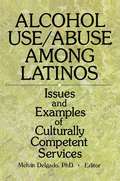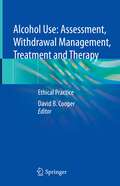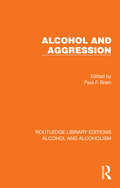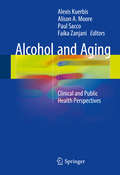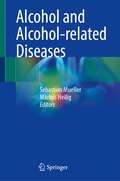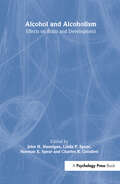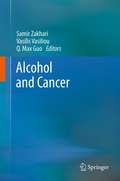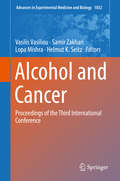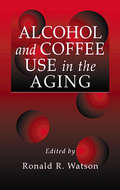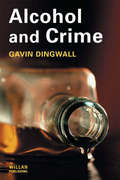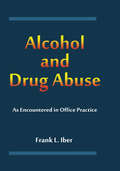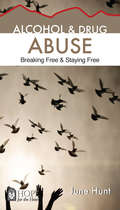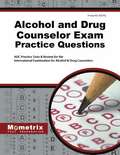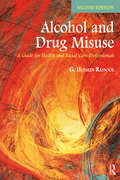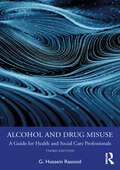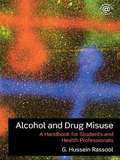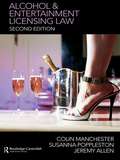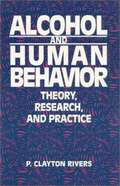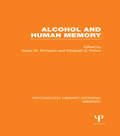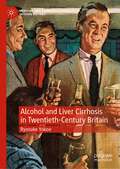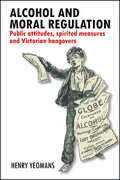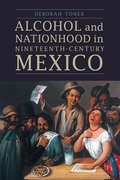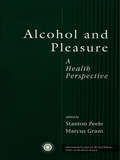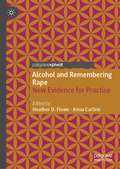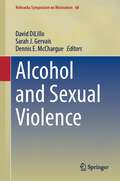- Table View
- List View
Alcohol Use/Abuse Among Latinos: Issues and Examples of Culturally Competent Services
by Melvin DelgadoIn Alcohol Use/Abuse Among Latinos: Issues and Examples of Culturally Competent Services, you will learn how to design and improve services for Latinos with substance abuse problems by understanding that the cultures and personal backgrounds of your clients are crucial to the counseling process. This text will also show you how these service skills apply to the individual, family, or an entire community. Studies show that, according to patients, culturally sensitive and responsive practitioners are generally more credible, trusted, and effective. Alcohol Use/Abuse Among Latinos takes into account several different aspects that will help you develop these traits and provide successful services for Latinos dealing with alcohol or other drug problems. You&’ll gain valuable insight into:the five elements that are vital to a successful ATOD (Alcohol, tobacco and Other Drug) service--multiculturism, resilience/strengths, competence, community capacity development, and community participation--plus a detailed explanation of why they are needed step-by-step instructions for using three methods, supervision, inservice training, and consultation, as means of providing ongoing learning of cross-cultural competencies to practitioners why key factors such as economic background, gender, and sexual orientation need to be taken into consideration for ATOD services to be effective demographic patterns and case studies of Latino users and abusers of alcohol and other drugs that illustrate the growing number of Latinos in need of ATOD services why the practitioner needs to be aware of how family importance, values attached to cooperation versus competition, sociability, respect, and action-oriented problem-solving play a role in effective services for Latinos the need for practitioners to understand how ethnic identity, biculturality, Spanish language fluency, gender-specific role expectations, skin color, and overall sense of self can affect the success of services for Latino teenagers how excessive marketing of alcohol to Latino communities, lack of representation, and a lack of community involvement are key barriers to successful ATOD services for LatinosAlcohol Use/Abuse Among Latinos also discusses Latino mens’and womens’individual needs concerning substance abuse. One of the topics addressed, the loss of self-esteem, has been found to be a contributing factor to alcohol use and abuse for Latinas. It offers ways you can promote self-esteem in your Latina clients by focusing on their cultural heritage and pride. In addition, this text takes a unique look Latina lesbians and how training through educational and agency internship programs can promote awareness to your clients&’ special needs concerning substance abuse. Alcohol Use/Abuse Among Latinos will help you provide all of your Latino clients with efficient and culture-friendly services for resisting or overcoming the abuse of alcohol, tobacco, or other drugs.
Alcohol Use: Ethical Practice
by David B. CooperThe book brings together the most up-to-date knowledge and expertise covering the whole topic of alcohol. It presents the practical skills needed to offer ethical intervention and treatment and implement ethical person-centered care. It is a practice-based text that aims to improve ethical relationships, responses, care and practice necessary to be effective in interventions and treatment with those experiencing alcohol use and health problems. The focus is on combining the principles and philosophy of alcohol prevention and intervention, in hospital and community. Each chapter provides self-assessment exercises, reflective practice exercises, key points and a "to learn more" section, and develops a theoretical framework, before broadening to include application in care and practice. This work will appeal to a wide readership, from professionals working within the mental health care and practice environment to mental health students.
Alcohol and Aggression (Routledge Library Editions: Alcohol and Alcoholism)
by Paul F. BrainIn the 1980s the relationship between alcohol and aggression and violence was a controversial one. Much of previous thinking had been based on anecdotal evidence. In contrast this book, originally published in 1986, is based upon recent scientific evidence from a broad range of studies from animal experimentation to clinical and social research. The initial chapters describe what aggression is, in terms of theories of animal behaviour, how alcohol influences neural and endocrine functions and behaviour and how problematic it often is to extrapolate from animal research to humans. Later chapters give critical reviews of attempts to relate alcohol intake to violence and crime. The book represents a major synthesis of work from many disciplines and will interest workers in animal behaviour, alcohol studies, psychopharmacology and social psychology.
Alcohol and Aging: Clinical and Public Health Perspectives
by Alexis Kuerbis Alison. A. Moore Paul Sacco Faika ZanjaniThis book provides a current perspective on alcohol and aging to better understand the trends, costs, benefits, and clinical and community evidenced-based strategies. This book embraces not only the physical, cognitive, psychological, and social health benefits of moderate drinking in the elderly, it also delves into the risks of excessive drinking, including physical and psychiatric morbidity, neurodegeneration, medication complications, and accidents and injuries, and loss of independence. Written by experts in the field, this book is the only current text that includes the most current scientific, research, empirical, and practice information alongside a comprehensive review of the status of the field that will help guide alcohol use management and stimulate future research. Alcohol and Aging is the ultimate resource for all researchers, educators, clinicians, and professionals working with older adults who drink.
Alcohol and Alcohol-related Diseases
by Markus Heilig Sebastian MuellerAlcohol is one of the major risk factors for negative health outcomes worldwide. It accounts for more than 60 alcohol-related diseases, ranging from addiction, through liver cirrhosis, to cancer. Collectively, these conditions account for mortality and morbidity that make alcohol use one of the leading preventable causes of disability adjusted life-years (DALYs) lost globally. In this book, an international faculty covers all aspects of alcohol-related disorders, ranging from addiction/alcohol use disorders (AUD) to alcohol-related diseases of other organs such as liver, heart or cancer. A special focus is to reach out to primary care physicians who are in the front line of this major health problem. The book also provides an update for addiction specialists, as well as specialists in internal medicine, gastroenterology and hepatology. The book is divided into sections that include epidemiology, alcohol use disorders and addiction, alcohol-related liver disease, alcoholic hepatitis, primary care and interdisciplinary approaches and other alcohol-related diseases. Besides current diagnostic measures and treatment strategies, the book deals with the many underlying molecular and genetic mechanisms of alcohol toxicity. Novel insights include prospective data on all-cause mortality and the emerging major role of alcohol-mediated hemolysis and enhanced red blood cell turnover. The book also aims at guiding policy makers to handle the topic of alcohol in our society more responsibly.
Alcohol and Alcoholism: Effects on Brain and Development
by Norman E. Spear John H. Hannigan Linda P. Spear Charles R. GoodlettThis is the first volume that focuses on the lifespan neurobehavioral factors likely to determine susceptibility to alcohol abuse and its consequences. The chapters offer careful analysis of the effects of ethanol on the fetus, the infant, the adolescent, and the adult. The authors include behavioral neuroscientists and clinical neuropsychologists. Their topics range from the neurochemical and neuroanatomical consequences of prenatal alcohol to the cognitive consequences of prenatal alcohol on preschool and school-age children. The impact of genetics on sensitivity to alcohol is considered in terms of analytic tests using techniques of behavioral genetics and molecular biology. The consequences of exposure to alcohol during breastfeeding are described in experiments with human infants. The alcoholism that develops in adulthood is analyzed through the experimental study of relapse from alcohol deprivation and assessment of neuropsychological impairments and treatment for alcoholics. Drawing on extensive research that has applied techniques from molecular neurobiology and tests of learning and memory to the clinical assessment and treatment of alcoholics. The volume answers recent questions raised by the National Institute of Alcohol Abuse and Alcoholism and the National Institute of Drug Abuse about the role of early experience in susceptibility to later abuse of alcohol and other drugs. Although epidemiological studies can describe the problem, solutions in terms of mechanisms that mediate these effects will be found only with the kinds of experimentally oriented approaches the chapter authors describe.
Alcohol and Cancer (Advances in Experimental Medicine and Biology #815)
by Samir Zakhari Vasilis Vasiliou Q. Max GuoThe World Health Organization has identified chronic alcohol consumption as one of the top ten risk factors for worldwide burden of disease. The International Agency for Research on Cancer has identified alcohol as carcinogenic to humans, including cancers of the upper aerodigestive tract, colon, liver and breast. Alcohol's actions may be direct e.g. effects on retinoic acid and one-carbon metabolism, or indirect, through metabolites such as acetaldehyde and reactive oxygen species or through various signaling pathways that influence cell cycle and apoptosis that may contribute to carcinogenesis. This report reviews the state of the art in alcohol-related cancer research in ten chapters.
Alcohol and Cancer: Proceedings of the Third International Conference (Advances in Experimental Medicine and Biology #1032)
by Samir Zakhari Vasilis Vasiliou Helmut K. Seitz Lopa MishraFollowing the Third Alcohol and Cancer Conference, this volume compiles the most up-to-date research on the role of alcohol consumption in carcinogenesis, from epidemiology to pathology metabolism and stem cells. More specifically, it delves into the effects of alcohol consumption and thyroid cancer, CD133+ progenitor cells, carcinogenic iron accumulation, developmental morphogens, and cancer-inducing epigenetic changes. Alcohol and Cancer: Proceedings of the Third International Conference is a timely update to Biological Basis of Alcohol-Induced Cancer, which followed the Second Alcohol and Cancer Conference, compiling cutting-edge research from graduate students, young scientists, and researchers. It is ideal for graduate students and researchers in oncology, hepatology, epigenetics, and alcohol consumption.
Alcohol and Coffee Use in the Aging
by Ronald R. WatsonAs we age, our physiology changes. Also, we tend to place less emphasis on proper nutrition. The more elderly we grow, the less resistant we become to major diseases such as cancer and heart disease. This state of affairs renders the elderly more vulnerable to alcohol and other drugs of abuse. Alcohol and tobacco are routinely used together. Chroni
Alcohol and Crime
by Gavin DingwallAlcohol is massively associated with crime. Evidence from the British Medical Association found that alcohol use is associated with 60-70 per cent of murders, 70 per cent of stabbings, 50 per cent of fights or assaults in the home. For non-violent offences the association is very strong as well: 88 per cent of those arrested for criminal damage, 83 per cent for breach of the peace, 41 per cent for theft and 26 per cent for burglary, had drunk in the four hours prior to their arrest. At the same time there has been intense concern about public drunkenness in town and city centres, especially on the part of young people, and the cost and damage this causes. This book seeks to understand the nature of the connection between alcohol and crime, and the way the criminal justice system responds to the problem, providing a clear and accessible account and analysis of the subject. It draws upon a wide range of sources and research findings, and also sets the subject within a broader comparative context. It takes an interdisciplinary approach, and includes a sociological account of the role of alcohol in British society, a criminological analysis of the link between alcohol and crime and a philosophical consideration of individual responsibility for harm caused whilst intoxicated, and a legal analysis of different approaches that can be adopted as a response to alcohol-related offending.
Alcohol and Drug Abuse as Encountered in Office Practice
by Frank L. IberThis book has been written to serve as a manual for physicians practicing in a private office setting to recognize and recommend appropriate treatment for patients believed to be substance abusers. While it is not written for drug abuse specialists, it provides information regarding the diagnosis and treatments a competent, concerned physician can provide without becoming immersed in addiction treatment. Topics discussed include the degree to which a physician should become involved, when it is appropriate to refer, using other professions and volunteer groups, and useful medications. Guidelines for recognizing substance abuse, testing to confirm the abuse, confronting the patient, and motivating the patient into specific treatment are also presented. Tables and illustrations are used to summarize major points, making this an extremely useful reference tool for internists and other non-specialist private practitioners.
Alcohol and Drug Abuse: Breaking Free & Staying Free (Hope for the Heart)
by June HuntAlcohol and Drug Abuse--Breaking Free and Staying FreeMany people who have an alcohol or drug abuse problem deny it, saying they can stop any time they want. But family and close friends suspect it might be something more. Do you often wonder, "Is it really an addiction?" And if so, do you know how to help your loved one to break free? Can a person be set free permanently from a chemical dependency?The answer is YES--there is hope! Christian recovery and healing can take place, and June Hunt, author of Alcohol and Drug Abuse: Breaking Free & Staying Free offers sound biblical and practical advice for helping your loved one quit the cycle of drug and alcohol abuse for good! The Lord wants to heal those struggling with addictions. It's never too late to ask God for a renewed soul, free from whatever weighs them down. In just 96 pages, this mini-book will give you a good overview of the causes and signs of drug and alcohol abuse, and will give you the next steps to take. Getting educated is one of the steps. Learn the helpful definitions that clarify the difference between drug use, substance abuse, and dependency. Other definitions include:• Four major drug classifications• Three leading indicators of addiction• Codependency: both a relationship addiction and a substance addiction? • How a person with an addiction can continue their destructive patterns. Does your loved one have a chemical dependency? Find out in the 19-question checklist on drug or alcohol addiction provided in this book The section titled "Steps to Solutions" is filled with Christian recovery advice including Scripture and practical steps that point to:• Deliverance from dependency• 7 don'ts for being freed from an addiction• 10 spiritual tips for recovery• How to conduct a crisis intervention• And much more
Alcohol and Drug Counselor Exam Practice Questions: ADC Practice Tests and Review of the International Examination for Alcohol and Drug Counselors
by ADC Exam Secrets Test Prep Staff<p>Alcohol and Drug Counselor Exam Practice Questions are the simplest way to prepare for the Alcohol and Drug Counselor test. Practice is an essential part of preparing for a test and improving a test taker's chance of success. The best way to practice taking a test is by going through lots of Alcohol and Drug Counselor practice questions. <p>Our Alcohol and Drug Counselor Exam Practice Questions give you the opportunity to test your knowledge on a set of questions. You could know everything that is going to be covered on the test but still perform poorly if you have not had a chance to practice. Repetition is a key to success and using Alcohol and Drug Counselor practice test questions allows you to reinforce your strengths and improve your weaknesses. <p>Detailed answer explanations are also included for each question. It may sound obvious, but you have to know which questions you missed (and more importantly why you missed them) to be able to avoid making the same mistakes again when you take the real test. That's why our Alcohol and Drug Counselor Exam Practice Questions include answer keys with detailed answer explanations. These in-depth answer explanations will allow you to better understand any Alcohol and Drug Counselor questions that were difficult for you or that you needed more help to understand.</p>
Alcohol and Drug Misuse: A Guide for Health and Social Care Professionals
by G. Hussein RassoolWritten by an experienced academic author, lecturer and practitioner, this comprehensive textbook provides an introduction to alcohol and drug misuse. It presents: the context of alcohol and drug misuse, and the nature and theories of addiction, including a historical overview and policy initiatives in contemporary society an overview of the problems associated with psychoactive substances and their impact on groups such as culturally and linguistically diverse communities, young people, women, older people and the homeless an understanding of the generic role responses to substance misuse in a variety of different settings and contexts, including primary care, the community and hospitals a framework for assessment, care planning, harm reduction approaches, dealing with overdose, intoxication and withdrawals, and psychological and pharmacological interventions an accessible and skills-oriented approach to assist students and practitioners in dealing with alcohol and drug misuse. This new edition is fully updated and includes new material on: evidence-based pharmacological interventions; recent global strategies in alcohol and drug; dual diagnosis and women; shisha smoking; and current statistics on prevalence of alcohol and drug misuse Alcohol and Drug Misuse takes into account current policy and practice for substance use and misuse and includes a range of pedagogical features to enhance learning. It is essential reading for nursing, health and social work students taking substance misuse modules, as well as related CPD courses for health and social care professionals.
Alcohol and Drug Misuse: A Guide for Health and Social Care Professionals
by G. Hussein RassoolThis comprehensive textbook provides an accessible and skills-oriented introduction to alcohol and substance misuse for healthcare students and practitioners new to the field.Divided into five parts, this text explores: The context of alcohol and drug misuse and the nature and theories of addiction, including a historical overview and policy initiatives in contemporary society. An overview of psychoactive substances and the problems associated with them. An exploration of the impact of psychoactive substances on groups, such as culturally and linguistically diverse communities, young people, women, older people, and the homeless. An understanding of the generic role responses to substance misuse in a variety of different settings and contexts, including primary care, the community, and hospitals. A framework for assessment, care planning, harm reduction approaches, dealing with overdose, intoxication and withdrawals, and psychological and pharmacological interventions. This new edition is fully updated and includes expanded coverage of performance-enhancing drugs, e-cigarettes, cannabis use, gender disparities in substance use and treatment, public health approaches to substance use, and screening tools for alcohol misuse. Alcohol and Drug Misuse is enhanced with activities and learning outcomes throughout.It is essential reading for nursing, healthcare, and social work students taking substance misuse modules, as well as related post-registration/qualification courses for health and social care professionals.
Alcohol and Drug Misuse: A Handbook for Students and Health Professionals
by G. Hussein RassoolWritten by an experienced author and lecturer, this five part text presents an introduction to drug and alcohol misuse and provides: the context of alcohol and drug misuse, and the nature and theories of addiction, including a historical overview and policy initiatives in contemporary society an overview of the problems associated with psychoactive substances and their impact on groups such as black and minority ethnic people, young people, women, older people and the homeless an understanding of the generic role responses to substance misuse in a variety of different settings and contexts, including primary care, community and hospitals a framework for assessment, care planning, harm reduction approach, dealing with overdose, intoxication and withdrawals, psychological and pharmacological interventions an accessible and skills-oriented approach to assist students and practitioners in dealing with drug and alcohol misuse. Alcohol and Drug Misuse takes into account current policy initiatives and practice for substance use and misuse and includes a range of pedagogical features to enhance learning. It is essential reading for nursing and health students taking substance misuse modules, as well as related CPD courses for health care professionals.
Alcohol and Entertainment Licensing Law
by Colin Manchester Susanna Poppleston Jeremy AllenThis comprehensive and authoritative guide to licensing law is co-authored by the UK’s only professor of licensing law and two eminent licensing practitioners. It provides a detailed exposition and contextual analysis of the legal provisions governing the licensing of alcohol and entertainment under the Licensing Act 2003, encompassing both the legislative and decision-making framework of the Act as well as its implications for human rights. Fully updated and revised, it covers the various forms of authorization for licensable activities and licence and certificate conditions that might be attached as well as the enforcement and appeal provisions of the Act. This new edition, building on the highly acclaimed original work published in 2005, includes subsequent legislative changes and case law decisions. New additions to this edition include: expanded coverage of enforcement provisions and police powers a revised and extended chapter on appeals, in light of the practical and procedural developments that have evolved in the appeal process amendments to existing regulations and the revised Statutory Guidance issued in 2007. This book is essential reading for all local authorities, legal advisers, licensing policy advisors, operators and the police as well as those applying for licences.
Alcohol and Human Behavior: Theory, Research, and Practice
by P. Clayton RiversSurveys the critical issues discussed in the field, pointing out how each issue has been approached from several theoretical perspectives.
Alcohol and Human Memory (Psychology Library Editions: Memory)
by Elizabeth Parker Isabel BirnbaumOriginally published in 1977, the chapters in this volume offer a concise review of the research and new direction in the study of alcohol and cognition at the time. Each chapter has been prepared by an eminent researcher who was currently involved in investigating human cognitive behaviour. The chapters contain not just a dry summary of work done in the field, but descriptions of the impetus for the work that was done, problems in doing such work, knowledge that was gained, and suggestions for future research. Many new approaches are presented for the study of alcohol and memory, and for the understanding of results of studies already done. This was a forward-looking volume not only about directions for future research, but with solid contributions that review and integrate major areas of inquiry on the influence of alcohol on memory and behaviour at the time.
Alcohol and Liver Cirrhosis in Twentieth-Century Britain (Medicine and Biomedical Sciences in Modern History)
by Ryosuke YokoeThe relationship between alcohol consumption and liver cirrhosis has long been contested by doctors and medical professionals, creating numerous implications for the public reputation of alcohol in Britain. Despite this, it was not until the 1970s that cirrhosis came to be understood as an ‘alcoholic disease’. This book contextualises developments in this debate through the twentieth century by examining the significant influence that medical expertise had on policy responses to alcohol misuse, as well as the social reputation of alcohol consumption. It demonstrates how the degree to which drinking was seen to be responsible for liver disease directly shaped how different groups, such as the temperance movement and the drinks industry, exaggerated or downplayed the destructive properties of alcohol. Covering a series of themes including the science of disease causation, the social standing of medical expertise, and alcohol and public health policy, this book argues that in order to properly understand the trajectory of debates around drinking we need to consider the twentieth-century ‘alcohol problem’ as primarily a medical issue. Contrary to the tendency by existing works to disassociate perceptions and responses to alcohol use from the objective knowledge of its effects on the body, this book shows that medical understandings of liver disease influenced how alcohol was conceptualised in relation to its harms. Offering a fresh perspective on the interaction between scientific knowledge and policy during the twentieth century, this book provides insights for those researching the social, political and cultural history of modern Britain, as well as historians of medicine and health.
Alcohol and Moral Regulation: Public Attitudes, Spirited Measures and Victorian Hangovers
by Henry YeomansAlcohol consumption is frequently described as a contemporary, worsening and peculiarly British social problem that requires radical remedial regulation. Informed by historical research and sociological analysis, this book takes an innovative and refreshing look at how public attitudes and the regulation of alcohol have developed through time. It argues that, rather than a response to trends in consumption or harm, ongoing anxieties about alcohol are best understood as ‘hangovers’ derived, in particular, from the Victorian period. The product of several years of research, this book aims to help readers re-evaluate their understandings of drinking. As such, it is essential reading for students, academics and anyone with a serious interest in Britain’s ‘drink problem’.
Alcohol and Nationhood in Nineteenth-Century Mexico (The Mexican Experience)
by Deborah TonerDrawing on an analysis of issues surrounding the consumption of alcohol in a diverse range of source materials, including novels, newspapers, medical texts, and archival records, this lively and engaging interdisciplinary study explores sociocultural nation-building processes in Mexico between 1810 and 1910. Examining the historical importance of drinking as both an important feature of Mexican social life and a persistent source of concern for Mexican intellectuals and politicians, Deborah Toner’s Alcohol and Nationhood in Nineteenth-Century Mexico offers surprising insights into how the nation was constructed and deconstructed in the nineteenth century. Although Mexican intellectuals did indeed condemn the physically and morally debilitating aspects of excessive alcohol consumption and worried that particularly Mexican drinks and drinking places were preventing Mexico’s progress as a nation, they also identified more culturally valuable aspects of Mexican drinking cultures that ought to be celebrated as part of an “authentic” Mexican national culture. The intertwined literary and historical analysis in this study illustrates how wide-ranging the connections were between ideas about drinking, poverty, crime, insanity, citizenship, patriotism, gender, sexuality, race, and ethnicity in the nineteenth century, and the book makes timely and important contributions to the fields of Latin American literature, alcohol studies, and the social and cultural history of nation-building.
Alcohol and Pleasure: A Health Perspective (ICAP Series on Alcohol in Society)
by Stanton Peele Marcus GrantThere is no simple threshold between the experience of drinking and the pleasure it can bring on the one hand and the pain and suffering caused by alcohol abuse on the other. But if we are to understand the role of alcohol in society, then at the very least we need to acknowledge the pleasure as well as the pain. Alcohol and Pleasure aims to bring together existing knowledge on the role of pleasure in drinking and determine whether the concept is useful for scientific understanding and policy consideration.
Alcohol and Remembering Rape: New Evidence for Practice
by Anna Carline Heather D. FloweThis book examines how alcohol intoxication impacts upon the memory of rape victims and provides recommendations for how best to investigate and prosecute such rape complaints. An estimated 75% of victims are under the influence of alcohol during a sexual assault and yet there is surprisingly little guidance on conducting interviews with complainants who were alcohol-intoxicated during the attack. This book will provide a distinctive, rigorous and important contribution to knowledge by reviewing the evidence base on the effects of alcohol on memory performance. The book brings together a range of academics from various disciplines, including psychology, law and criminology, and it discusses the implications for practice based on consultation with various criminal justice practitioners, including police officers, barristers who defend and prosecute rape cases and policy makers.
Alcohol and Sexual Violence (Nebraska Symposium on Motivation #68)
by Sarah J. Gervais Dennis E. McChargue David DiLilloThis book provides a chronology of the 68th Nebraska Symposium on Motivation, which is focused on contemporary research knowledge about sexual violence and alcohol use. This book is more specific to dating and intimate partner sexual violence in young adult populations. The target audience is researchers, prevention agencies and policymakers within academia and military settings. Alcohol use has long been recognized as a major contributor to sexual assault, with an estimated 50% of sexual assaults in the U.S. involving drinking by the victim, perpetrator, or both. Beyond the usual harmful effects, alcohol-involved assaults are associated with unique sequelae for female victims, including increased self-blame, stigma, and greater alcohol use to cope. Moreover, heavier drinking on the part of the perpetrator is associated with more serious incidents of assault (e.g., involving physical force) that result in more severe outcomes for victims. The purpose of this Symposium on Motivation is to bring together a group of experts in the areas of alcohol and sexual aggression to articulate the causes, consequences, and mechanisms of alcohol-involved sexual assault. Speakers will talk about classic and contemporary research and theories on these issues using cutting-edge approaches (e.g., virtual reality, neuroscience, laboratory-based alcohol administration) from a variety of perspectives (perpetrators, victims, bystanders).
